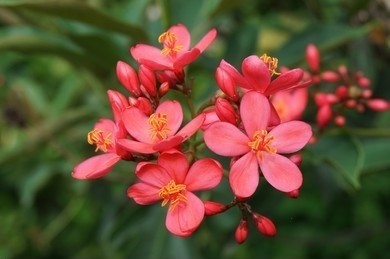Jatropha Plant Tissue Culture
 A flowering plant among Jatropha plants
A flowering plant among Jatropha plants
Jatropha plant can be used not only for landscaping but also as
an important bioenergy species with great potential.
Jatropha plants belong to the family Euphorbiaceae and contain more than 200 species of plants, mostly shrubs and small trees (also deciduous plants), widely distributed in tropical and subtropical areas.
Jatropha plants are abundant in the wild and have the advantages of few pests and diseases, strong resistance, wide adaptability, etc. They can grow in dry and infertile soils and are excellent species for afforestation and forest fire prevention in barren mountains and wastelands, stone desertification areas, and dry hot valleys.
Jatropha curcas L. plant in this genus is especially the main raw material for the production of bioenergy, bio-pesticide, bio-medicine, and bio-feed. In addition, it is also an excellent silvicultural material for water retention and soil consolidation, preventing sanding, increasing organic soil quality, and building protective forests, which plays an important role in improving the ecological environment and restoring vegetation.
Tissue culture service
There is no large-scale industry of the Jatropha plant yet, and the genus has not yet been able to play its proper role. Therefore, Lifeasible has established a stable tissue culture system of the Jatropha plant, which can be applied to the large-scale production of the Jatropha plant. This is beneficial to the research and development of the Jatropha plant in renewable energy, environmental protection, green ecology, bioengineering, and high-tech products.
Regeneration pathways
- Induction of adventitious buds through healing tissue
- Induction of adventitious buds directly from explants
- Seedling production by somatic embryo
We have established efficient tissue culture regeneration systems using hypocotyls, petioles, leaves, stem segments (with axillary buds), seeds, and cotyledons of Jatropha plants as explants. We also successfully performed anther culture in Jatropha plants. By obtaining DH lines with stable traits, we have greatly improved breeding efficiency and shortened breeding time.
Our common media include MS, WPM, 1/2 MS, etc. And we add appropriate plant hormones such as IBA, IAA, NAA, 6-BA, KT, TDZ, and 2,4-D to the media according to the actual situation.
You want to sign a confidentiality agreement.
You have a specific plant species for your experimental needs.
You have a reliable and relevant cooperation project to discuss.
You are very interested in our project or have any questions.
You need an updated and detailed quotation.
For research or industrial use.

 A flowering plant among Jatropha plants
A flowering plant among Jatropha plants
